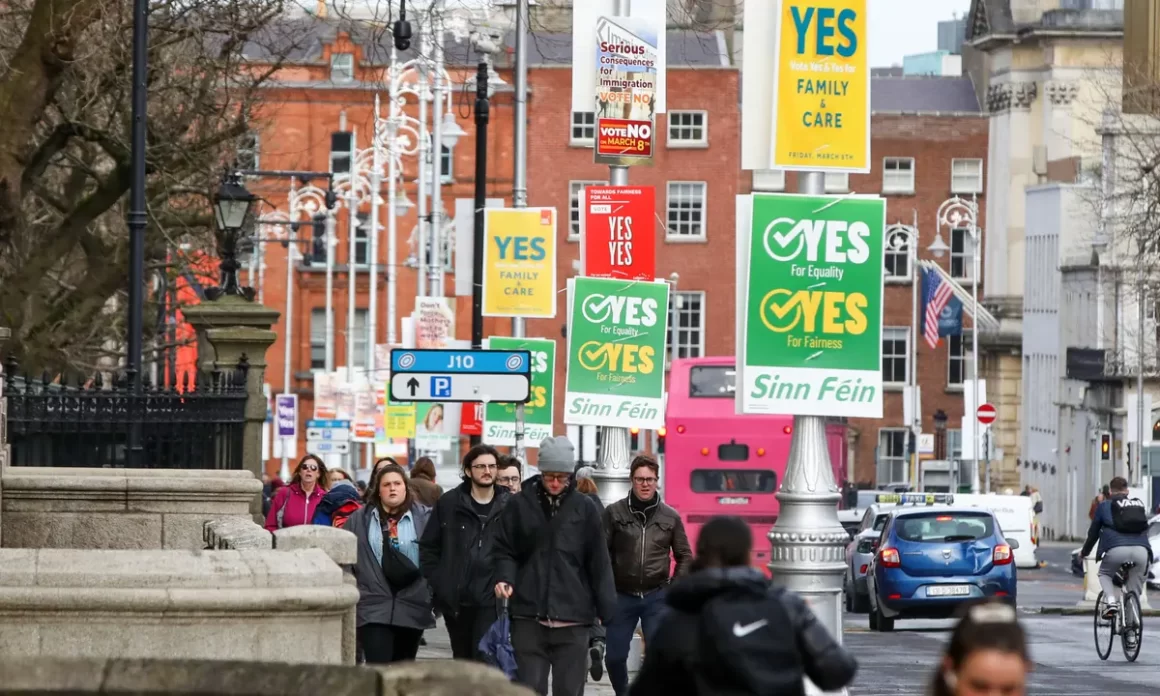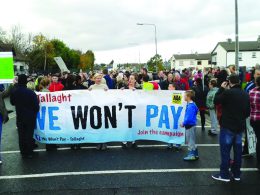The most significant and noteworthy development in the Family and Care referendums that were resoundingly rejected on 8 March 2024, was the emergence of a powerful grassroots movement of disabled activists, resolutely demanding their full rights. This dynamic, aided also by carers who were similarly rejecting the neo-liberal version of care in the proposed wording – combined with a profound distrust of the capitalist political establishment – decisively shaped the outcome of the vote.
This outcome was a huge blow to the Government, whose cynical posturing as a force for progress – even while twisting a straightforward issue into a neo-liberal mess – was given short shrift. Opposition parties and liberal feminist organisations that campaigned for a Yes / Yes – and continued to do so despite the movement of disabled activists and allies calling for a Yes / No from a progressive and radical perspective – have also been damaged.
A necessary switch
During the campaign, after listening to disabled activists, the Socialist Party in fact switched to a Yes / No position. In a statement from 4 March, Mick Barry TD and Ruth Coppinger wrote that:
“After listening to the real concerns raised by disabled people and having discussions about how disabled activists feel that the Care Referendum can negatively affect them, we have decided to change our stance in that referendum to a No.”
“We have had to give the matter a lot of consideration and while our initial position was for Yes / Yes because we were supportive of removing sexist, gendered care roles from the Constitution, we were never supportive of the replacement wording chosen by the government. In the Dáil and subsequently we made the point that they rejected the recommendations of the Citizens’ Assembly and Oireachtas Committee, but we opted on balance to support it, not considering it worse than the existing Constitutional commitment to support care.”
“However, during this campaign, disabled activists, carers and others have brought their issues and new and compelling arguments into the debate. In particular, disabled people have raised their voices and said not alone do they not trust the government to “strive to” support them based on an entire life experience of having to fight for absolutely everything, but they also see real dangers in embedding into the Constitution a locating of care at home among the family – with no mention or commitment to care in the community. They have stated the amendment reinforces ableism, charity and neo-liberal ideals and runs contrary to the socialised care we favour as socialists.”
Disabled activists lead the way
While polls before the vote indicated majorities for both amendments among decided voters, the numbers were diminishing as the campaign went on, and it was clear the significant ‘undecided’ cohort would determine the outcome. The dynamic of a surge from below led by disabled activists calling for a No in the Care referendum, which gathered huge momentum in the campaign’s final days, was such a strong factor that it helped tip the balance for No votes in both referendums. The deep alienation and widespread distrust of the Government and state paved the way for this. More than anything else, the argumentation from disabled activists pushed a greater number of people to just vote No to both Government proposals, or to not vote at all – the 44% turnout was relatively low compared to 64% for Repeal and 61% for Marriage Equality.
While undoubtedly huge confusion and a mix of both progressive and backward ideas can be found in many of the reasonings as to how people determined their vote, this dynamic – of disabled activists raising their voices and their vital demands for socialised care, real rights and full equality, and the mass of ordinary people listening to them – is undeniably progressive.
It’s a shame that others, including the People Before Profit TDs who Mick Barry works with in the Dáil to amplify a left position, did not shift their position to take on board the demands of radicalised disabled activists. This can fuel further mistrust between these activists and the organised left, when in fact they should be enmeshed as one in struggle against the Government and system as a whole. The Socialist Party has recognised through this campaign – through engagement with disabled activists – that we have not sufficiently sought to address ableism. Ableism is widespread and innate in capitalist society and culture, so it must be actively fought inside our own movements, like all other forms of oppression.
We are committed to working with the disabled community to seek to address this, as well as to aid and support the struggles of this community – not least the campaign to scrap the Thatcherite and dangerous Government Green Paper on disability.
“Anti-woke” vote?
Many in the media and political establishment have interpreted the referendum results as indicating that the progressive movements of the 2010s are giving way to a more definitive right-wing backlash, but this is a crudely one-sided and, therefore, an incorrect analysis. Nevertheless, conservative figures and far-right groups have been quick to insist that “Woke is dead”. Fianna Fáil TD Wille O’Dea, for example, has posted on social media that: “Fianna Fáil needs to get back to basics & abandon the Hate Speech Bill etc. Focus on Housing, Health and Law & Order and stop playing to the woke gallery. Start listening to the people, stop talking down to them and stop listening to the out of touch Greens & NGOs”.
The core analysis that should emerge from these referendums is that the milquetoast and cynical attempt by the government to capitalise on a “feminist” referendum failed miserably. The refusal to actually listen to the Citizens’ Assembly recommendations, feminist and LGBTQI+ groups, carers and especially disabled activists resulted in weakly / offensively worded proposals that left the door open for widespread confusion and genuine criticism. Of course in understanding this we should not be blind to the reality that in the political vacuum that exists in this country, there is also a growth in conservative, right-populist and far-right ideas, which were also reflected in the overall vote.
The Family referendum, which was meant to expand the definition of a family beyond marriage, lost with 67.7% voting No and 32.3% voting Yes. The Care referendum, which aimed to remove sexist language on the duty of women and mothers in the home, while still placing the primary burden of care on the family unit, lost with 73.9% voting No and 26.1% voting Yes.
Exit polls conducted by the Irish Independent for both referendums illustrate the breadth of issues at play for voters. For the family referendum some of the main reasons listed for people voting No included “lack of clarity and information”, “opposition to the government and mistrust”, “contentment with the current wording”, “concerns about legal and social complications”, and “personal and philosophical reasons.” The latter two reflect more clear cut conservative viewpoints, including anti-immigrant sentiment in terms of allowing for family reunification, and protecting the institution of marriage.
Progressive No votes were more clearly expressed in the Care referendum. For instance, “poor wording and lack of clarity” was noted, particularly relating to the phrase ‘strive to’ being seen as absolving the Government of its responsibility to provide care, which was also more explicitly referenced in “concerns about Government responsibility and support for carers.” Other reasons included that the amendment represented “insufficient change” and a fear about the removal of “the protection of women and mothers in the constitution.”
This last reason in particular can reflect the real ways in which women, mothers, and lone parents have been consistently let down by the state. For many working-class women especially, their treatment at the hands of a misogynistic and anti-working class state – the dismissal of the caring role they so often play without remuneration or recognition in capitalist society – means that their identity as mothers is extremely important to them, especially in light of these systemic discriminations they face. However, it also reflects, at least to some degree, the impact of insidious transphobic arguments about gender-neutral language erasing the rights of women.
“Nothing about us without us”
The most important and positive development to emerge from the referendums is the seeds of a formidable disability rights movement. A powerful slogan from this movement “nothing about us without us” seems especially apt here. Grassroots activists spurred the progressive Yes / No vote that emerged in the final weeks by refusing to accept any constitutional change which speaks about care without taking into account the rights and autonomy of disabled people.
Disability rights groups and carers from the beginning insisted that the government accept the wording of the Citizens’ Assembly in large part because it placed much more responsibility on the state to provide care and expanded the responsibility of care to go beyond the home and include broader society. Even in early weeks there were reports of NGOs receiving calls from carers, disabled people, and lone parents about the problematic wording of the referendums. A carer quoted in The Journal reflects the heart of the progressive Yes / No component of the vote:
“While we agreed with the modernisation of our Constitution, we did not agree it should be at the cost of replacing sexism with ableism and ignoring the rights of the people who give and receive care. This wording reduced people with disabilities to mere recipients of care, non-autonomous burdens to be foisted on families while the State washed its grubby hands promising merely to ‘strive’ to support us.”
The progressive Yes / No combination was the most clear expression of left-wing consciousness – 83% Solidarity-People Before Profit voters voted Yes in the Family referendum and 83% voted No in the Care referendum. Women under 45 were the highest voting bloc for Yes in family at 46% and No for care at 77%.
The Socialist Party is grateful for all of those who engaged us and prompted us to make the necessary shift in position. We look forward to seeing disabled activists and carers take the momentum garnered by the progressive No campaign into a vibrant disability rights movement, which we would be more than happy to assist and participate in.
Ignorance of the government
The reliance of capitalism on the family as the primary unit of care places more unpaid care duties on women; financially impedes families with caregiving responsibilities; and undermines the autonomy of disabled people, especially those who seek to leave abusive family dynamics.
The ignorance of the government to this reality was best expressed through the Taoiseach’s interview on The Six o’Clock Show. When asked about the Care referendum and locating care in the home, Varadkar said, “My experience of life, and I’m sure it’s most people’s experience of life, is that my parents brought me up. They cared for me. When they’re old I’m gonna make sure they are looked after. God forbid if something happened to either of my sisters, I would make sure my nephews and nieces, that they’ve a home, and education. I don’t actually think that’s the State’s responsibility, to be honest. I do very much think that’s a family’s responsibility.”
The fact that Leo Varadkar is saying this on a salary of more than a quarter of a million a year was not lost on viewers. It was strikingly out of touch with the reality of most working-class and even middle-class people. Lone parent families, for instance, makeup 75% of homeless families and have a networth seven times smaller than the average household. Low income families with disabilities are 19 times more likely to spend more than 5% of their income on medical care than their higher income counterparts. 13% of adults with physical disabilities in Ireland are living in consistent poverty and 23% are at risk of poverty.
Varadkar’s Thatcherite remarks – his political essence on display in this interview peppered with all its ugly distaste for anyone who doesn’t fit some upper class mythical family ideal – was a key moment in the campaign, pushing momentum behind rejection of both Government proposals.
The disabled people, young people, trans people, women at the helm of the progressive sentiments within these shambolic referendums represent a way forward through the confusion and posturing of the Government. We cannot let them use these defeats as an excuse to fall back on conservative policies, but rather continue to build a feminist, disability rights, anti-racist, LGBTQI+ movement that challenges their patriarchal, ableist, capitalist conceptions of care, and replaces it with a socialist model that centres the dignity and autonomy of all.












